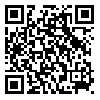Thu, Jan 29, 2026
[Archive]
Volume 1, Issue 4 (12-2022)
RHMS 2022, 1(4): 7-13 |
Back to browse issues page
Download citation:
BibTeX | RIS | EndNote | Medlars | ProCite | Reference Manager | RefWorks
Send citation to:



BibTeX | RIS | EndNote | Medlars | ProCite | Reference Manager | RefWorks
Send citation to:
Sabbaghi M, Miri K, Sarboozi-hoseinabadi T, Namazinia M. Stress, Anxiety and Depression among Nurses and Personnel of Pre-hospital Emergency Department during the Covid-19 Pandemic: A Comparative Study. RHMS 2022; 1 (4) :7-13
URL: http://jrhms.thums.ac.ir/article-1-53-en.html
URL: http://jrhms.thums.ac.ir/article-1-53-en.html
Department of Nursing, School of Nursing and Midwifery, Torbat Heydariyeh University of Medical Sciences, Torbat Heydariyeh, Iran , mnamazi99@gmail.com
Abstract: (1148 Views)
The World Health Organization deemed the 2019 coronavirus pandemic a public health emergency in January 2020. For those working in healthcare, this worldwide crisis has presented a variety of challenges. The treatment teams have experienced mental health issues and anxiety due to an increase in workload, high-risk circumstances including ongoing interaction with contaminated environments, an increase in mortality as a result of the coronavirus, a loss of family contact, and exhaustion. In order to compare stress, anxiety, and depression among nurses and pre-hospital emergency staff during the COVID-19 pandemic, we decided to conduct the current study.
This descriptive-cross-sectional study was conducted between October 2020 and September 2021 with the participation of 125 nurses working in the inpatient wards of 19 patients with Covid-19 in the 9th of Dey Hospital of Torbet Heydariyeh City and the participation of 544 pre-hospital emergency personnel. The average level of depression, anxiety and stress in both groups of nurses and pre-hospital emergency workers was significant (P<0.001). According to the results, the severe level of depression, anxiety and stress of pre-hospital emergency personnel was 5.9, 8.6 and 2.8% respectively and it was found more as compared to nurses. Considering the time period of the current study and the fact that most nurses worked with Covid-19 patients, the frequency of depression, anxiety and moderate to severe stress was higher in them. Despite direct contact with patients, pre-hospital emergency personnel showed a lower prevalence of depression, anxiety and stress, which may be due to the home quarantine of many patients with covid-19 and the use of complementary medicine, the transfer rate of these patients performed less by pre-hospital emergency.
This descriptive-cross-sectional study was conducted between October 2020 and September 2021 with the participation of 125 nurses working in the inpatient wards of 19 patients with Covid-19 in the 9th of Dey Hospital of Torbet Heydariyeh City and the participation of 544 pre-hospital emergency personnel. The average level of depression, anxiety and stress in both groups of nurses and pre-hospital emergency workers was significant (P<0.001). According to the results, the severe level of depression, anxiety and stress of pre-hospital emergency personnel was 5.9, 8.6 and 2.8% respectively and it was found more as compared to nurses. Considering the time period of the current study and the fact that most nurses worked with Covid-19 patients, the frequency of depression, anxiety and moderate to severe stress was higher in them. Despite direct contact with patients, pre-hospital emergency personnel showed a lower prevalence of depression, anxiety and stress, which may be due to the home quarantine of many patients with covid-19 and the use of complementary medicine, the transfer rate of these patients performed less by pre-hospital emergency.
Subject:
General
Received: 2023/02/26 | Accepted: 2024/07/21 | Published: 2024/10/2
Received: 2023/02/26 | Accepted: 2024/07/21 | Published: 2024/10/2
Send email to the article author
| Rights and permissions | |
 | This work is licensed under a Creative Commons Attribution-NonCommercial 4.0 International License. |




